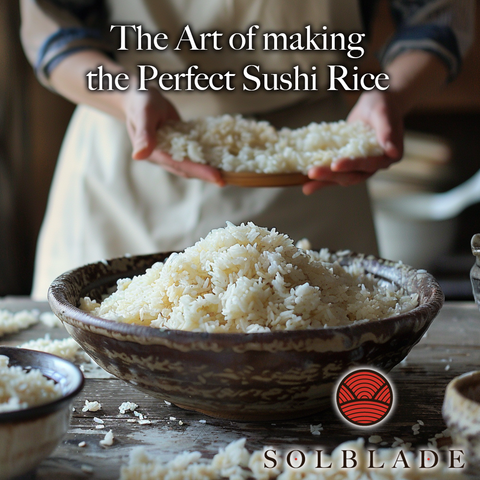Making sushi at home can transform from a daunting task to an enjoyable and fulfilling experience with the right knowledge and tools. At the heart of this culinary art form lies the perfect sushi rice—glossy, sticky, and subtly seasoned, it's the canvas for your sushi creations. Equally important is the precision offered by high-quality Japanese chef knives, like the Origin Chef's Knife, which ensures the finest cuts for your ingredients. This guide will walk you through each step of making sushi rice and how a premium chef knife can elevate your sushi to a professional level.

Table of Contents
Key Takeaways
- The foundation of mouth-watering sushi is perfectly seasoned and cooked sushi rice.
- Precision in slicing ingredients is paramount, achievable with a Japanese chef knife.
- Proper care extends the life and efficiency of your chef knives, making every slice as perfect as the first.
Part 1: The Foundation of Sushi - Making the Perfect Sushi Rice
Understanding Sushi Rice
Sushi rice, known as shari in Japanese, is much more than just a side; it's the soul of sushi. Its origins date back to Southeast Asia, where the method of fermenting fish in rice was discovered to preserve it. Today, sushi rice is seasoned with a mix of vinegar, sugar, and salt, offering a tangy backdrop that complements the freshness of fish and other toppings.
Selecting the Right Ingredients
- Rice: Short-grain Japanese rice, known for its ability to absorb water and stick together, is ideal.
- Seasonings: A blend of rice vinegar, sugar, and salt is used to season the rice to perfection.
Essential Tools for Sushi Rice Preparation
While a rice cooker and bamboo mat are staples in sushi rice preparation, the role of a Japanese chef knife cannot be overstated. A sharp, well-balanced knife like the Origin Chef's Knife is crucial for finely chopping vegetables and slicing fish, ensuring each component integrates seamlessly with the rice.
Step-by-Step Guide to Making Sushi Rice
- Washing the Rice: Rinse under cold water until the water runs clear to remove excess starch.
- Cooking the Rice: Use a 1:1.2 ratio of rice to water for the perfect texture, whether in a rice cooker or on the stovetop.
-
Seasoning the Rice: Gently fold in the vinegar mixture while the rice is still warm to ensure thorough absorption.

Table 1: Essential Tools and Ingredients for Perfect Sushi Rice & The Precision of Japanese Chef Knives
|
Feature |
Description |
Importance |
|
Type of Rice |
Short-grain Japanese rice preferred for its sticky and absorbent nature. |
Critical for achieving the authentic texture and taste of sushi rice. |
|
Rice Washing Technique |
Rinse under cold water until clear to remove excess starch. |
Ensures the rice has the perfect texture and is not too sticky. |
|
Rice Cooking Method |
Rice cooker vs. stovetop methods. |
Affects the consistency and preparation ease of sushi rice. |
|
Seasoning Mix |
A blend of rice vinegar, sugar, and salt. |
Balances the sweetness and tanginess, complementing the sushi fillings. |
|
Chef Knife Blade Material |
High-carbon steel for sharpness and durability. |
Essential for precise and effortless cutting of ingredients. |
|
Chef Knife Handle Design |
Ergonomic for comfort and control. |
Reduces fatigue and increases precision during long cooking sessions. |
|
Maintenance |
Hand washing recommended; periodic sharpening with a whetstone. |
Extends the life and efficiency of the knife, ensuring consistently fine cuts. |

Part 2: Perfecting Sushi with Precision and Quality Tools
The Importance of Precision Cutting
The texture and presentation of your sushi are greatly influenced by how ingredients are sliced. This is where a Japanese chef knife proves indispensable. Its sharpness and precision allow for thin, consistent slices that not only look professional but also enhance the eating experience.
How to Choose the Best Japanese Chef Knife
When selecting a chef knife, consider the blade material, handle comfort, weight, and balance. The Origin Chef's Knife, with its ergonomic design and exceptional sharpness, is an excellent choice for both novice and experienced sushi chefs.
Care and Maintenance of Japanese Chef Knives
- Cleaning: Hand wash and dry immediately to prevent rusting.
- Sharpening: Use a whetstone regularly to keep the edge razor-sharp.
- Storage: A wooden block or magnetic strip will protect the blade from damage.
FAQs
How long can sushi rice be stored? Sushi rice is best used immediately but can be kept at room temperature for a few hours. Refrigeration is not recommended as it hardens the rice.
Can I make sushi rice without a rice cooker? Absolutely. The stovetop method, though requiring more attention, can produce equally satisfactory results.
What makes Japanese chef knives different from other knives? Their unique construction, balance, and the quality of steel used in Japanese chef knives allow for unparalleled precision and durability.
How often should I sharpen my chef's knife? For optimal performance, sharpen your knife every 1-2 months, depending on usage.

Conclusion
Mastering the art of sushi rice and utilizing the right tools, like a superior Japanese chef knife, are fundamental steps towards achieving sushi that rivals your favorite restaurant's. Embrace these techniques and tools, and you'll find the process of making sushi at home both rewarding and enjoyable.
For those who appreciate the precision of Japanese culinary tools, investing in a high-quality chef knife, such as the Origin Chef's Knife, is a decision that enhances not just sushi making but all facets of cooking.



